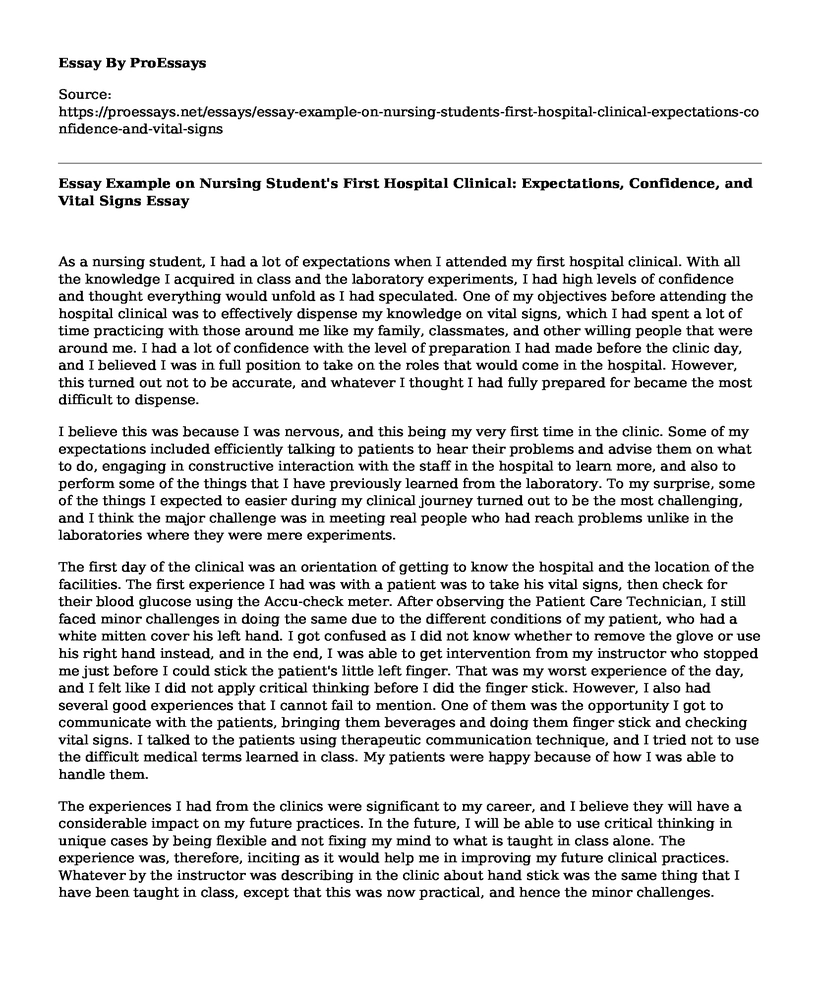As a nursing student, I had a lot of expectations when I attended my first hospital clinical. With all the knowledge I acquired in class and the laboratory experiments, I had high levels of confidence and thought everything would unfold as I had speculated. One of my objectives before attending the hospital clinical was to effectively dispense my knowledge on vital signs, which I had spent a lot of time practicing with those around me like my family, classmates, and other willing people that were around me. I had a lot of confidence with the level of preparation I had made before the clinic day, and I believed I was in full position to take on the roles that would come in the hospital. However, this turned out not to be accurate, and whatever I thought I had fully prepared for became the most difficult to dispense.
I believe this was because I was nervous, and this being my very first time in the clinic. Some of my expectations included efficiently talking to patients to hear their problems and advise them on what to do, engaging in constructive interaction with the staff in the hospital to learn more, and also to perform some of the things that I have previously learned from the laboratory. To my surprise, some of the things I expected to easier during my clinical journey turned out to be the most challenging, and I think the major challenge was in meeting real people who had reach problems unlike in the laboratories where they were mere experiments.
The first day of the clinical was an orientation of getting to know the hospital and the location of the facilities. The first experience I had was with a patient was to take his vital signs, then check for their blood glucose using the Accu-check meter. After observing the Patient Care Technician, I still faced minor challenges in doing the same due to the different conditions of my patient, who had a white mitten cover his left hand. I got confused as I did not know whether to remove the glove or use his right hand instead, and in the end, I was able to get intervention from my instructor who stopped me just before I could stick the patient's little left finger. That was my worst experience of the day, and I felt like I did not apply critical thinking before I did the finger stick. However, I also had several good experiences that I cannot fail to mention. One of them was the opportunity I got to communicate with the patients, bringing them beverages and doing them finger stick and checking vital signs. I talked to the patients using therapeutic communication technique, and I tried not to use the difficult medical terms learned in class. My patients were happy because of how I was able to handle them.
The experiences I had from the clinics were significant to my career, and I believe they will have a considerable impact on my future practices. In the future, I will be able to use critical thinking in unique cases by being flexible and not fixing my mind to what is taught in class alone. The experience was, therefore, inciting as it would help me in improving my future clinical practices. Whatever by the instructor was describing in the clinic about hand stick was the same thing that I have been taught in class, except that this was now practical, and hence the minor challenges.
Cite this page
Essay Example on Nursing Student's First Hospital Clinical: Expectations, Confidence, and Vital Signs. (2023, Apr 09). Retrieved from https://proessays.net/essays/essay-example-on-nursing-students-first-hospital-clinical-expectations-confidence-and-vital-signs
If you are the original author of this essay and no longer wish to have it published on the ProEssays website, please click below to request its removal:
- Course Work - Nursing Exercises
- Topic: Effectiveness of Palliative Care on Management of Cancer
- Syphilis and Confidentiality Essay
- Ken Robinson's Presentation on "Do Schools Kill Creativity" Analysis Essay
- Essay Sample on Essentialism: Teaching Students Core Knowledge and Patriotism
- Annotated Bibliography Sample on Medication Errors: Understanding and Avoiding Adverse Effects
- Understanding Varicose Vein Problems - Free Report Example







